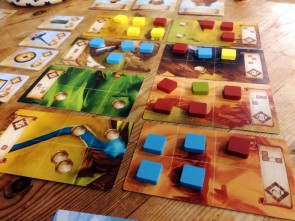In my third article about teaching games, I want to talk about light games. The advantage of these games is, that they are easy to teach and quick to learn - and often also quick to play. So, this article should be rather short, but as we know, the easier something is, the better you have to execute it and given that lighter games are usually the sort of games new people to the hobby will come in contact with first, we need to do a good job teaching these types of games or we may miss a chance to grow our hobby. So, no pressure.
As I said, light games are usually easy to teach. That's because there are usually very few rules and very few mechanisms. There is very little people have to remember when they play these kinds of games. Most of the time, it's literally just a matter of explaining the overall goal of the game and then going over the handful of rules or mechanisms. That's it.
Take Karuba by Rüdiger Dorn from HABA for example. The goal is to get your four explorers to the temple of the same colour. To do that, you have to place tiles to make paths or you can discard a tile and move a single explorer a number of spaces, depending on the number of "exits" of the discarded tile. You can also pick up silver and gold coins along the way. The first to reach a temple of a certain colour gets more points than the second, third, etc. player to reach the temple of the same colour and whoever has the most overall points at the end of the game wins. That's basically all there is to it.
Sure, there are a few more things to explain, like when the game ends for example or the fact that tiles are drawn at random, but everyone places the same tile at the same time. It's probably also worth pointing out that it's possible to cut off your explorers and make it impossible for them to reach their target, as well as how many tiles of each type are available, but really, none of that is very important at the beginning of your first game.
You don't need to explain any of that until people have taken a handful of turns and got used to the order of play and how the tile placement and movement work. You can start the game really quickly and people shouldn't feel too daunted to give it a go, especially if you're the one drawing the tiles and helping people a little. Everyone should get into it quite quickly and then you can add the other bits, like end game conditions, probabilities of different tiles, etc.
People will then very quickly work out for themselves what the best way of placing the different tiles is or when to go for movement rather than tile placement. They will learn the game together and discover the different strategies for deciding how to lay out their paths. They will realise how the random setup of explorers and temples has an influence on which tiles you need for optimum efficiency. It's this part that you will never have to explain, but it's what players will work out for themselves, as they watch what others are doing or as they learn from their own mistakes.
It won't take long either. Lighter games have the advantage that people will develop different approaches quite quickly, because there aren't too many different mechanisms to worry about or rules to remember, so you can focus on the game. Light games also usually play very quickly, so you can iterate through different approaches really quickly.
Light games are also ideal to introduce one or two new mechanisms to people. Deciding between movement and laying paths in Karuba is an interesting choice to make, for example, and something that new people to the hobby won't necessarily have to worry about in other games. If you want to introduce people to deck building, then a game like Fort could be a great start. It also teaches a bit of resource management at the same time. Colt Express teaches hand management, programming as well as bluffing.
So light games are an ideal step towards more complex games. Use games where certain mechanisms stand in the foreground to then lead onto slightly heavier games. However, be careful when you choose your game to do so. If you've been in the hobby quite a bit, what you think is light may feel more medium-weight to people who are just starting out in our hobby. Your perception will have changed over time and as I said in the introduction, we want to avoid scaring people away from our great hobby.
Speaking of being wary of scaring people away, light games, which have really distilled a single mechanism are great to try this mechanism out before committing to more complex games, whether this is to see if someone new to the hobby might like certain types of games or if it's for yourself, the veteran in the hobby, who wants to see if these kinds of games are for you.
So, whatever light game you choose and for whatever reason, you should have no problem explaining them and chances are you will introduce new people to our wonderful hobby, while having a lot of fun at the same time. I bet you can think of at least one light game that you could play with people and the holidays might be the ideal time to introduce new people to board games.
If you do, please let me know in the comments below. I'd love to hear what light game you taught and to whom and what they thought.
 Games
Games How to resolve AdBlock issue?
How to resolve AdBlock issue? 
















